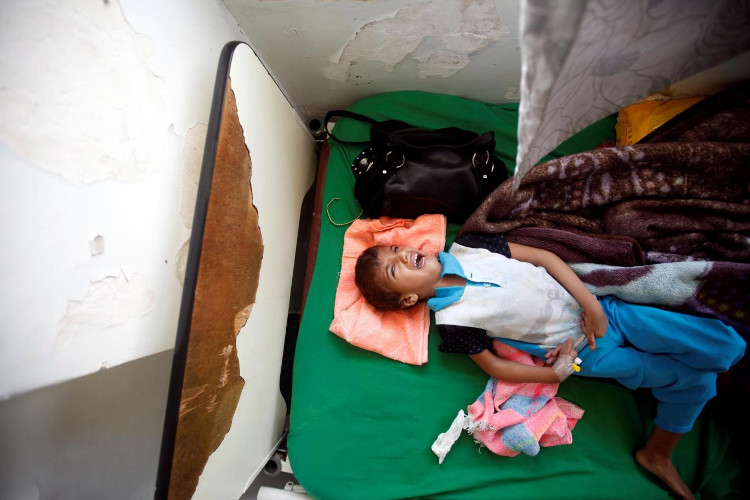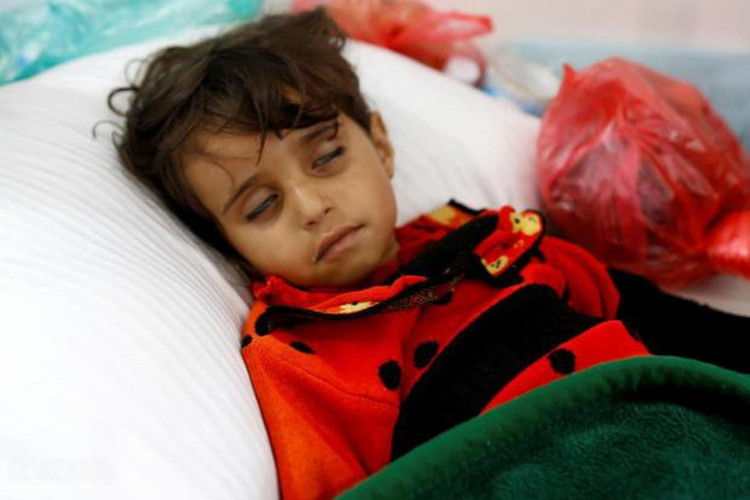The worst cholera epidemic in history broke out in Yemen
500,000 Yemeni people suffer from cholera, killing nearly 2,000 people in the worst epidemic in history.
After the war, hunger and disease became a Yemeni threat. From April to now, cholera in this country has caused half a million people to get sick and nearly 2,000 deaths, becoming the most serious outbreak in history. Every day Yemen has up to 5,000 people with cholera or new acute diarrhea.

A baby has cholera.(Photo: Reuters).
According to the BBC, cholera is an intestinal infection caused by food or water contaminated with Vibrio cholera. Most patients do not appear symptoms or mild. In severe cases, cholera can lead to death within a few hours without intervention.
Cholera is mainly in children and the elderly , the two most vulnerable subjects. UN statistics show that 41% of cases and one quarter of deaths occur because cholera is a child.
In Yemen, cholera spreads strongly due to alarming sanitation and lack of clean water supplies. Hunger makes cholera appear and vice versa, the disease can also lead to malnutrition."A vicious cycle of death , " the Independent said.
Before the worst cholera epidemic in history, Yemen's health system struggled to fight. Enduring the aftermath of the war, more than 50% of health facilities were closed, medicine was extremely scarce, 30,000 health workers did not receive wages for a year and had to work under conditions "impossible accept".

Malnutrition facilitates development of cholera.(Photo: Reuters).
"Thousands of people are ill but do not have enough hospitals, medicines and clean water , " said Dr. Tedros Adhanom Ghebreyesus, director of the World Health Organization (WHO). "Doctors are the backbone of the health care system. We cannot do anything without them. Physicians need to be paid to continue saving people."
Tens of thousands of volunteers have gone to Yemen to mobilize and propagate families to protect themselves from cholera and distribute soap and hygiene tools. This is important but not enough. In particular, the WHO's chief emergency officer, Rick Brennan, said that although the number of new cases of cholera has decreased, the disease is at risk of a sudden outbreak in August and September when the rainy season comes.
Calling for Yemeni forces to quickly find a political solution, Dr. Tedors expressed: "The people of Yemen cannot stand it any longer. They need peace to rebuild their country and life."
- Cholera pig in China can spread to other countries
- Swine cholera threatens Asia
- Find out where the cholera originates from the world
- Super-strong cholera bacteria are all from Asia
- The African cholera epidemic continues to be complicated
- Rebels find 3,000-year-old mummies in Yemen
- Find out the darkest period in history, all kinds of disasters pouring down on humanity
- Cholera epidemic raging in eastern India
- Volcanic eruption in Yemen
- Overview of cholera swine in Africa
- Predicting malaria epidemic thanks to sea temperature
- 9 monster epidemics in human history
 Green tea cleans teeth better than mouthwash?
Green tea cleans teeth better than mouthwash? Death kiss: This is why you should not let anyone kiss your baby's lips
Death kiss: This is why you should not let anyone kiss your baby's lips What is salmonellosis?
What is salmonellosis? Caution should be exercised when using aloe vera through eating and drinking
Caution should be exercised when using aloe vera through eating and drinking